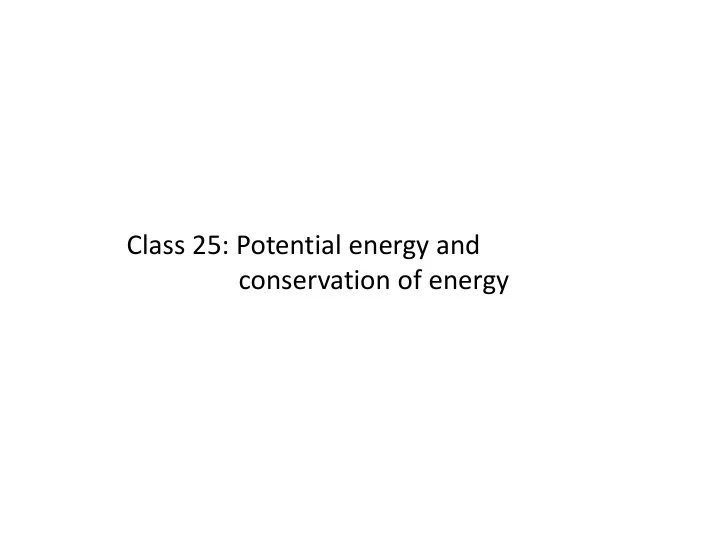

Class 25: Potential energy and conservation of energy
Conservative and non ‐ conservative forces Conservative force Non ‐ conservative forces 1. W independent of path. 1. W not only depends on W depends only on initial initial and final positions, it and final positions. also depends on the path. 2. W 0 even if the particle 2. If the particle moves back to the same point, moves back to the same W=0. point. 3. Examples: Gravity 3. Examples: friction. (weight), spring, gravitational attraction.
Potential energy Work – Kinetic Energy Theorem K K K Work done by F f i i i Work done by F Work done by F i i Conservati ve Non - conservati ve forces forces K Work done by F Work done by F i i Conservati ve forces Non - conservati ve forces U U Work done by F i Conservati ve forces K U Work done by F i Non - conservati ve forces U is called the potential energy.
Potential Energy Case 1b: Gravity y y f f f i i i y i mg x Only if upward is positive U W U U mg (y y ) f i f i f W mg (y y ) U mgy i Calculation is path independent (upward is positive)
Potential Energy Case 2: Spring F= -kx Extension x x=0 L (natural length) F= -kx Compression x 1 2 2 1 U W U U k(x x ) f 2 2 f i f i W k(x x ) 2 i 2 1 2 U kx Calculation is path 2 independent
Potential Energy Case 3: Gravitational force f r f M r i m i 1 1 1 1 U W U U GMm W GMm f i r r r r f i f i GMm U Calculation is path independent r
Conservation of energy K U Work done by non - conservati ve F i i or (K K ) ( U U ) Work done by non - conservati ve F f i f i i i Mechanical energy ( K + U) is said to be conserved if work done by non-conservative forces = 0. K+ U = 0 if that is the case.
Recommend
More recommend